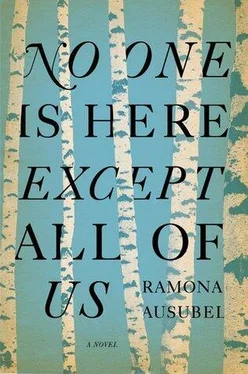Perl, Vlad, Moishe and the tailor’s daughter were so close together they felt fused. If one of their hearts had stopped it would not have mattered because the others would have pumped for that body, too.
The people heard two voices outside, just there, and then a tap on the window. The single bullet hole in the wall went dark. The villagers heard the men outside laugh.
For several seconds they heard the exact and complete sound of nothing.
Then the door opened and the moonlight was slapped down on the villagers, their bodies returned to being mountains and their faces returned to being jagged and no matter what they did, they did not become planks of wooden floor.
“Everyone’s together!” the men shouted. “How kind of you, to have gathered for us. You must have been waiting.” They were very tall and stood so straight as to look like statues. They wore pale green from helmet to boot, and the guns in their hands were shiny and animated, alive-looking. Nothing felt real. Yet now that the moment had arrived, it seemed inevitable. Almost a relief. When is it over? It is over now.
The children did not break first. The children kept their silence the longest. It was the fathers who went right away, trying to wrap their two pathetic arms around everything they loved. The arms seemed so short, so thin. Why were the arms not twice their length?
The sound in the room was of the fathers struggling to hold.
The mothers went next. When one began to cry loud enough to be heard, the room cracked. The children and the grandmothers and the uncles and the cousins. They cried because they cried. They cried because across the room and next to them, there was the sound of begging.
One of the men in uniform approached Perl. “This one is already bald, no lice on this one.” He slapped the shiny skin of her scalp.
The other man in uniform laughed. “Are you trying to steal from us?” he asked her. Perl looked hard at the floor. “Are you trying to steal from us?” the guard repeated.
No, she shook her head.
“Are you bald and dumb?”
Perl shook her head and the first man smacked it. “We wanted your hair,” he told her. “Didn’t you think we might want that?”
“What will you do to apologize?”
“She will shave the heads of the others,” the first man said. “She will get their dirty lice all over her.”
The people did all the possible things to do. They fought back. They were hit on their heads with the butts of guns. They hid behind shelves. They were dragged by their hair back out. They stood up, put their hands over their heads and waited to be shown the way. People put themselves in front of the ones they loved, saying, Take me, take me.
Stacks of things began to fall, and my people heard only the sound of them crashing down. The pots rang when they hit the floor. The books, the silverware, the saddles — all of it tumbled. The people were swallowed. The soldiers kicked the piles, listening for the yelp of a person underneath. The sound of their voices, once shrill and stabbing, became like the hiss of a fire — behind, around, but not central. The prayers in the villagers’ own heads were rumbling and thunderous. A silent cacophony. They all prayed the same prayer.
Please exist. We want to believe in You.
People had stopped asking for particulars. No requests for safety, no more hopes of a hole in the floor to hold them, no more wishes to replace one person with the other. They only said, as many times as they could: We are here. We want to trust You. We are here. Please exist. You will certainly watch us today. Won’t You? We are here.
The village began to come apart under its own hope. People felt as if their arms would snap off, their heads would roll and rest with the cabbages, their hearts would stick to the floor. When the butcher was taken by one man who held his wrists together, no one could believe that even now the butcher’s arms did not come gently off. We trust You. We trust You . Still, the shoulders hung on. All the knobbed ends of all the bones stayed cupped in their sockets.
The stranger said to no one in particular, “My daughter had long fingers and short toes. Her ears were like shells. Her brother followed her around asking her opinion on everything, and her father trusted her with his tools. I used to like to watch the crows hop across the woodpile. I can smell that wood right now. But I also remember the way the cabbage picker’s wife’s fingers felt as they cleaned the mud from between my toes on the day I washed up on this shore. I remember the taste of toasted bread in the jeweler’s house, and the smell of the butcher’s roasts. I remember the long, peaceful rainstorm of all our days since the beginning of the world. I remember, I remember, I remember.” She smiled, a wide and honest smile. The banker’s wife looked at her in confusion. “No,” said the stranger. “It is a privilege to remember. I am not afraid of it anymore. Absolutely everything is true.”
As the stranger’s words attached our two worlds back together, Perl saw a flash of my face at age five, before she could have imagined giving me away. She saw my uneven teeth, none of them yet fallen out. She saw the game I was inventing — a pencil-drawn maze that began in the cabbage field and ended at our big blue door, where the family was waiting with sloppy smiles on. Wherever you are, my mother said to me in her head, I hope you are home. I hope I am still yours. And for Regina she found two words clacking together: alive and love .
The first man in uniform dumped a basket of cabbages out onto the floor. “They love these things,” he said to one of the other men. “They should be grateful that we’ll dump their ashes over a cabbage field.” The man in uniform drew his fingers under my mother’s chin. “You’ll make excellent fertilizer.”
The men began to shoot at the ceiling and the chips of sky fell down on them, sharp rain, and the villagers put themselves in lines and waited their turn to follow the men out the door.
They went two by two, not cabbage pickers or tailor’s daughters or weavers or bankers or the wives of bankers or the strangers anymore. Vlad and Perl and Moishe? Just bodies among bodies, just animals, rattling out of their temple into the captured world.
The villagers were one body, each of them losing individual characteristics, their minds beginning to melt into a note of utter fear and utter hope, which were one feeling and not two as they might have believed before.
Outside, the rain had gathered its strength and pelted them all. The old stars, too far away to be shot down by bullets, greeted the line of people. “Let there be lights in the firmament of the heaven to divide the day from the night. And let them be for signs, and for seasons, and for days, and years,” the jeweler said.
“And by them, may we find our way,” the stranger whispered. Each person was given a new star, too. Their upper arms were wrapped with yellow bands, and on each band: one star. The soldiers had not tied the villagers’ hands together, expecting fear would be enough to bind the people.
The water was running away, it was beckoning. It was as if the sky, practicing all this time, was finally ready to wash the people to safety, to carry them. And the water prevailed upon the earth, and it bore them and lifted them up . The stranger took her lover’s hand and began to run. The others did not have to be told to follow. As if commanded by a single voice, which echoed at once in everyone’s heads: We are the stars, we are the heavens, let us spread out across the darkness. They ran and the water ran with them, everything moving together. Some people died quickly, from the hundreds of bullets fired at their backs. Some of them were injured, some captured. Perl felt the heat of her husband’s hand in hers, their fingers making a knot. In the other hand, Moishe’s palm was sweating and slippery. She felt like one part of a bigger body. Her arm and Vlad’s arm — her arm and Moishe’s — could not be prized apart. The blood flowed between them, the life they had shared. Perl became less and less herself and more and more everyone, everything, as she ran. Her heart thundered so loudly she knew the beating she heard was not hers alone. The people’s names did not matter — the difference between the banker’s body and the butcher’s body meant nothing now. Survival was not an individual pursuit, but a collective one. They were all of us. The air was thick with ghosts — every life lived on that land, every life lived in that story. Through the wheat, through the empty cabbage field, through the rain, across arteries they had made for themselves on the earth, the sound of their heart was one drum, all the chambers in all the chests, commanding, Let there be morning and evening, another day.
Читать дальше












